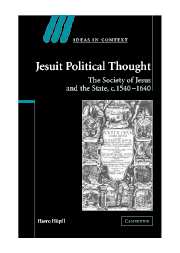Book contents
- Front Matter
- Contents
- Acknowledgements
- List of abbreviations
- Translations, references, and orthography
- Introduction
- 1 The character of the Society of Jesus
- 2 The Society's organisational ideas
- 3 The Society and political matters
- 4 The Church, the Society, and heresy
- 5 The confrontation with reason of state
- 6 Reason of state and religious uniformity
- 7 Jesuit reason of state and fides
- 8 Reason of state, prudence, and the academic curriculum
- 9 The theory of political authority
- 10 Limited government, compacts, and states of nature
- 11 The theory of law
- 12 The common good and individual rights
- 13 Tyrannicide, the Oath of Allegiance controversy, and the assassination of Henri IV
- 14 The papal potestas indirecta
- Conclusion
- Bibliography
- Index
- IDEAS IN CONTEXT
Introduction
Published online by Cambridge University Press: 22 September 2009
- Front Matter
- Contents
- Acknowledgements
- List of abbreviations
- Translations, references, and orthography
- Introduction
- 1 The character of the Society of Jesus
- 2 The Society's organisational ideas
- 3 The Society and political matters
- 4 The Church, the Society, and heresy
- 5 The confrontation with reason of state
- 6 Reason of state and religious uniformity
- 7 Jesuit reason of state and fides
- 8 Reason of state, prudence, and the academic curriculum
- 9 The theory of political authority
- 10 Limited government, compacts, and states of nature
- 11 The theory of law
- 12 The common good and individual rights
- 13 Tyrannicide, the Oath of Allegiance controversy, and the assassination of Henri IV
- 14 The papal potestas indirecta
- Conclusion
- Bibliography
- Index
- IDEAS IN CONTEXT
Summary
The Society of Jesus recognised from its inception that an engagement with the world of secular rulers was inescapable. Most Jesuits in most places and at most times of course had nothing to do with ‘matters of state’. They neither sought nor welcomed political prominence. But the Society's more hysterical opponents accused it of liking nothing better than interfering in politics. The Society's apologists for their part just as routinely proclaimed that the Society's own articles of association sternly prohibited any political meddling. But to no avail. Even the Oxford English Dictionary (entry Jesuit I. – composed c. 1900) perpetuates the apparently inseparable association between Jesuits and politics: ‘The stringent organization of the Order soon rendered it very powerful, and brought it into collision with the civil authority even in Roman Catholic countries … The secret power of the organization and the casuistical principles maintained by many of its representatives, and generally ascribed to the body as a whole, have rendered its name odious not only in English, but in French and other languages.’
It all obviously depended on what was to count as ‘meddling’. The founders never doubted that the Society's mission, to say nothing of the restoration of the Church, would require the patronage of well-disposed secular authorities or that, when called upon, members of the Society would render such services to rulers as were appropriate to men of the cloth.
- Type
- Chapter
- Information
- Jesuit Political ThoughtThe Society of Jesus and the State, c.1540–1630, pp. 1 - 7Publisher: Cambridge University PressPrint publication year: 2004



